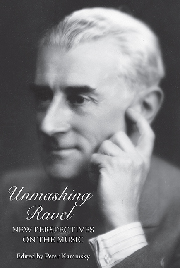Book contents
- Frontmatter
- Dedication
- Contents
- Acknowledgments
- Introduction
- Part One Orientations and Influences
- 1 Ravel's Poetics: Literary Currents, Classical Takes
- 2 Re-presenting Ravel: Artificiality and the Aesthetic of Imposture
- 3 Adorno's Ravel
- Part Two Analytical Case Studies
- Part Three Interdisciplinary Perspectives
- List of Contributors
- Index
3 - Adorno's Ravel
from Part One - Orientations and Influences
Published online by Cambridge University Press: 05 September 2013
- Frontmatter
- Dedication
- Contents
- Acknowledgments
- Introduction
- Part One Orientations and Influences
- 1 Ravel's Poetics: Literary Currents, Classical Takes
- 2 Re-presenting Ravel: Artificiality and the Aesthetic of Imposture
- 3 Adorno's Ravel
- Part Two Analytical Case Studies
- Part Three Interdisciplinary Perspectives
- List of Contributors
- Index
Summary
It is not surprising that philosopher, sociologist, cultural critic, and musicologist Theodor W. Adorno (1903–69), steeped in the Western European art of his era, should have written about Maurice Ravel and his music. What is surprising, is the insightfulness of this writing, given Adorno's well-known devotion to the Austro-German repertory, a tradition with markedly different aesthetic priorities. It is not difficult to imagine reasons for these valuable texts having been overlooked for so long. For Adornians, they would likely have seemed insignificant and ephemeral when set alongside his voluminous writings on Beethoven, Wagner, Mahler, Schoenberg, Berg, and others. For Ravelians, Adorno's cultural credentials would immediately disqualify his writings on the French composer from being taken as seriously as, for example, those of the philosopher Vladimir Jankélévitch, who wrote about not only Ravel, but also his compositional kinfolk, Debussy and Fauré.
Whatever the actual reasons for this neglect may have been, this essay seeks to bring it to an end by collating and assessing Adorno's commentary on Ravel, which is scattered across decades of published and unpublished texts. After surveying this commentary, I demonstrate ways to appropriate it for musical analysis before concluding with some methodological reflections.
Adorno's Ravel
Adorno's most extended discussion of Ravel is an essay first published in a 1930 issue of Anbruch, the Viennese journal that Adorno edited from 1928 to 1930. This essay was later incorporated into the collection Moments musicaux (1964) with only minor revisions; the relative invariability of the text over thirty-four years suggests the consistency of Adorno's understanding of Ravel over the course of his career.
- Type
- Chapter
- Information
- Unmasking RavelNew Perspectives on the Music, pp. 63 - 82Publisher: Boydell & BrewerPrint publication year: 2011

